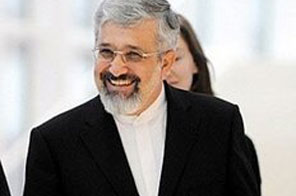Iran uranium talks set to resume
Iran was set to hold a third day of talks Wednesday with world powers on a uranium enrichment agreement, a deal which could help defuse tensions over its controversial nuclear programme.
The negotiations, on a proposal for Iran to ship its low-enriched uranium abroad for further processing, had appeared to stall on Tuesday but the parties met briefly and were due to hold further talks on Wednesday.
"I think and I believe that we are making progress," the head of the International Atomic Energy Agency, Mohamed ElBaradei, said after the talks Tuesday.
"It is maybe slower than I expected but we are moving forward and we are going to meet tomorrow at 10:00 am (0800 GMT)."
"We still hope to be able to reach an agreement. It's a complex process," ElBaradei told reporters.
"There are technical aspects, many technical issues that we have to hammer out. It is of course a question of confidence building, of guarantees," said the head of the UN's atomic watchdog.
The head of the Iranian delegation, Ali Asghar Soltanieh, described the talks as "constructive" and said that "discussions will continue tomorrow with all countries concerned."
The talks appeared to stall Tuesday over statements by Iranian officials that they no longer wanted France part of any deal, but diplomats said rather it was over differences on how to structure the deal.
Iran tentatively agreed at a meeting in Geneva with world powers on October 1 to ship some of its stocks of low-enriched uranium abroad for processing into fuel for an internationally supervised research reactor in Tehran.
The Geneva talks were the first in 15 months between Iran and the world powers which have been leading talks aimed at restricting Tehran's nuclear drive: Britain, China, France, Germany, Russia and the United States.
Western powers suspect Iran has embarked on research to build a nuclear bomb. Iran has denied the claims but has been accused by the IAEA of not cooperating with efforts to determine whether its atomic programme is peaceful.
The proposal has been seen as a possible means of helping resolve the standoff, which has seen Western powers threaten to slap more sanctions on Iran.
For international community the proposal would reduce the stock of uranium that Iran could potentially divert to weapons use.
Iran has 1,500 kilogrammes (3,300 pounds) of low-enriched uranium at its plant in Natanz, in defiance of three rounds of UN sanctions to back demands that it halt all enrichment activity.
For Tehran the proposal would mean at least a tacit recognition of its right to enrich uranium, a key Iranian demand, in addition to securing access to needed medium-enriched uranium.
Iran has said it is running short of medium-enriched uranium -- below weapons grade -- for its research reactor, which produces isotopes for medical use.
Enriched uranium can be used as fuel for a nuclear reactor or, in much purer form, as the fissile core of an atomic bomb.






